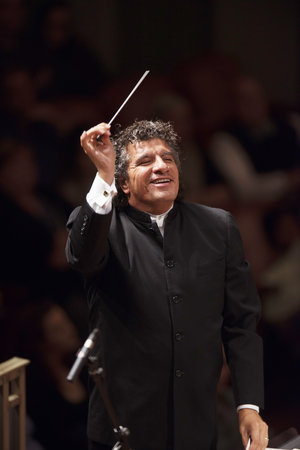Guerrero leads BSO in Bernstein’s problematic “Kaddish” symphony

Giancarlo Guerrero conducted the Boston Symphony Orchestra in music of Bernstein and Tchaikovsky Thursday night. File photo: Kurt Heinecke
Two months after the assassination of president John F. Kennedy, Leonard Bernstein’s Symphony No. 3 was given its American premiere in Symphony Hall by Charles Munch and the Boston Symphony Orchestra. The work seemed to capture the tumultuous feelings that rocked the country, for the symphony, scored for orchestra, choir, soprano soloist and narrator, questions God in an angry, unapologetic way.
The “Kaddish,” as Bernstein titled the symphony, wonders aloud about God’s silence in the face of this and other tragedies of the twentieth century. The work has had a mixed reception because of its brash narration, which can be uncomfortable for some religious observers. Boston critics at the time panned it as vulgar and overblown. Bernstein revised the work in 1977, but it remains a clear and personal expression of righteous anguish and anger.
Thursday night at Symphony Hall, the BSO offered this unusual score as part of its Bernstein centennial celebration with conductor Giancarlo Guerrero leading the way.
Bernstein’s original 1963 version, which was heard Thursday night, interpolates the Jewish Mourner’s Kaddish prayer with lines that show a contemporary person wrestling intensely with faith. Here, Bernstein drew from Jewish tradition, for questioning God has been a staple of Judaism since the days of Abraham and Moses.
Still, Bernstein’s text is the weakest aspect of the symphony, especially the original 1963 version, which can often dissolve into long-winded rambling. But at the same time there’s a power and surging emotionalism in the text. Through a one-sided dialogue, the speaker flips Noah’s covenant on its face and attempts to refashion humanity in God’s essence as well as image. Bernstein’s God is fallible and lonely, not the stalwart figure who glorifies in the phrase “thy will be done.”
Musically, the “Kaddish” Symphony is more successful, and Bernstein’s score captures the speaker’s indignation in a theatrical way. Stabbing dissonances, driving percussion, and sweeping melodies look ahead to his MASS, and the work is shot through with an uneasy peace. A brash chord at the symphony’s end suggests that all may not be right with the world.
Thursday’s vigorous performance brought a renewed sense of interest to this work. Guerrero drew playing of crackling energy. The brass sounded with power and precision in the symphony’s jazzy sections, while strings glowed in shades of light and darkness.
Bernstein’s original text called for a female speaker, and Thursday night Laila Robins delivered her part with conviction. Soprano Mary Wilson, making her BSO debut and subbing at the last minute for an ailing Tamara Wilson, delivered her solo passage with a light voice that grew in strength as the performance unfolded.
The Tanglewood Festival Chorus, prepared by James Burton, sang resplendently throughout to bring zest to Bernstein’s angular setting of the Kaddish prayer. The boys’ choir of St. Paul’s, Harvard Square, under direction of John Robinson, sounded with angelic voices in their featured moments. Thursday marked the first BSO performance of the “Kaddish” Symphony since its American premiere in 1964. Accomplished as the performance was, once every 54 years feels about right.
Tchaikovsky’ brooding Symphony No. 6, “Pathétique,” made for a searching concert opener, and Guerrero’s interpretation, which the conductor led without a score, reveled in the details.
The opening phrases, heard in double basses and bassoons, seemed to sound out from the mist, and later in the movement William R. Hudgins’ clarinet solo added a splash of light. Elsewhere, the brass, in quotations from the Russian Orthodox Requiem, supplied a funereal weight.
There was also a clear sense of direction in this performance. In Guerrero’s reading, each section progressed to the next and culminated in powerful climaxes. The first movement unfolded from anguished passages to ones of biting agitation and back again.
Yet there were also moments where Guerrero seemed to stop and smell the roses. The second movement’s off-kilter waltz was a charming, even coy, dance of delight. The third movement surged into passages of martial intensity to bring a brief moment of triumph.
Guerrero was at his best in the symphony’s finale. String lines swelled and died away as the movement brought an anguished end to a beautiful and expressive performance.
The program will be repeated 8 p.m. Friday and Saturday at Symphony Hall. bso.org; 888-266-1200
Posted in Performances